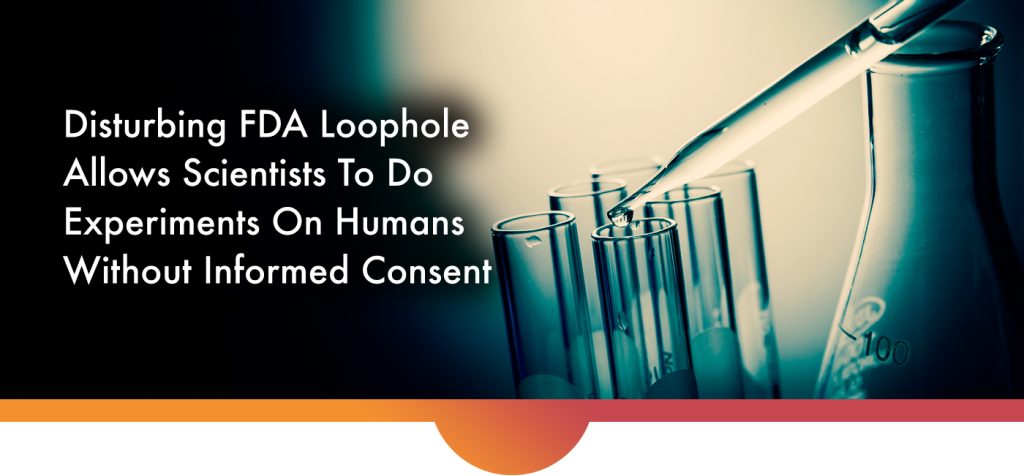Disturbing FDA Loophole Allows Scientists To Do Experiments On Humans Without Informed Consent


An FDA rule change published on December 21, 2023 solidifies that scientists are allowed to conduct human experiments without informed consent, as long as the research poses “minimal risk” and includes “appropriate safeguards to protect the rights, safety, and welfare of human subjects.” Investigation by ICAN’s legal team revealed that efforts to undermine informed consent protections have long been in the works, going back to at least 1962. ICAN has filed a FOIA request to dig deeper into this violation of one of our most basic human rights.
Informed consent is one of the bedrocks of human rights. It requires that (1) you be fully informed of the risks and benefits of any intervention or procedure and (2) that you consent to participate without coercion of any kind. Unfortunately, it turns out that Congress and our federal health authorities have been working to weaken informed consent protections for over 60 years!
On the heels of FDA’s new draft guidance which further weakens the already paltry clinical trial requirements for vaccine approval, FDA is once again implementing rules that take aim at informed consent protections. On December 21, 2023, FDA issued a final rule that “allows an exception from the requirement to obtain informed consent when a clinical investigation poses no more than minimal risk to the human subject and includes appropriate safeguards to protect the rights, safety, and welfare of human subjects.”
An investigation by ICAN’s attorneys revealed that back in 1962, Congress passed an amendment to the Food, Drug, and Cosmetics Act which directed HHS to create regulations that required researchers to “obtain the consent of such human beings or their representatives, except where they deem it not feasible or, in their professional judgment, contrary to the best interests of such human beings.” (Emphasis added.)
In 1981, both the FDA and HHS issued updated federal regulations regarding “The Protection of Human Subjects.” HHS’s regulations for example “exempt[ed] broad categories of research which normally present little or no risk of harm to subjects,” such as “study of data, documents, records and specimens.”
In 1991, the Federal Policy for the Protection of Human Subjects (also known as the Common Rule) was passed and adopted by HHS, along with 14 other federal departments—but not FDA. These regulations once again allowed informed consent exceptions when the research was deemed to be of “minimal” risk and met other criteria. Subsequent rule updates since 1991 have preserved these exceptions.
Now, with this latest rule, FDA claims that it is simply “harmoniz[ing]” its regulations with HHS and Common Rule language. That may be so, but unfortunately the new rule continues to perpetuate the practice of allowing researchers to waive some or all informed consent requirements, including when the following criteria are met:
(a) The clinical investigation involves no more than minimal risk to the subjects;
(b) The clinical investigation could not practicably be carried out without the requested waiver or alteration;
(c) If the clinical investigation involves using identifiable private information or identifiable biospecimens, the clinical investigation could not practicably be carried out without using such information or biospecimens in an identifiable format;
(d) The waiver or alteration will not adversely affect the rights and welfare of the subjects; and
(e) Whenever appropriate, the subjects or legally authorized representatives will be provided with additional pertinent information after participation.
Just how concerning is this? The above criteria mean that injectable vaccines are not likely to qualify for a waiver. (If they need to be face-to-face with you to give you an injection, clearly they can ask for your consent.) However, what about potential inhalable vaccines—the ones that are designed to spread from person-to-person? It certainly seems like if they can justify these types of products as “minimal risk” as they have in the past, this sort of rule could be used to shield researchers who wish to test transmissible products that may escape (or be intentionally released) in real world settings.
As the Informed Consent Action Network, ICAN takes threats to informed consent extremely seriously. Rest assured our attorneys are tracking the use of these provisions and monitoring whether they are being used to push novel investigative products on the unsuspecting—and unwilling—public. We will update you as soon as we learn more.
To support future legal action like this, click here to donate!
See below for more instances where ICAN has confronted health agencies over public safety:
No comments:
Post a Comment